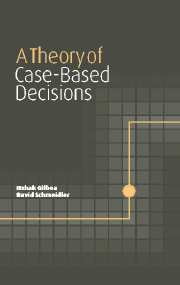1 - Prologue
Published online by Cambridge University Press: 22 September 2009
Summary
The scope of this book
The focus of this book is formal modeling of decision making by a single person who is aware of the uncertainty she is facing. Some of the models and results we propose may be applicable to other situations. For instance, the decision maker may be an organization or a computer program. Alternatively, the decision maker may not be aware of the uncertainty involved or of the very fact that a decision is being made. Yet, our main interest is in descriptive and normative models of conscious decisions made by humans.
There are two main paradigms for formal modeling of human reasoning, which have also been applied to decision making under uncertainty. One involves probabilistic and statistical reasoning. In particular, the Bayesian model coupled with expected utility maximization is the most prominent paradigm for formal models of decision making under uncertainty. The other employs rule-based deductive systems. Each of these paradigms provides a conceptual framework and a set of guidelines for constructing specific models for a wide range of decision problems.
These two paradigms are not the only ways in which people's reasoning may be, or has been, described. In particular, the claim that people reason by analogies dates back at least to Hume. However, reasoning by analogies has not been the subject of formal analysis to the same degree that the other paradigms have.
- Type
- Chapter
- Information
- A Theory of Case-Based Decisions , pp. 1 - 28Publisher: Cambridge University PressPrint publication year: 2001



